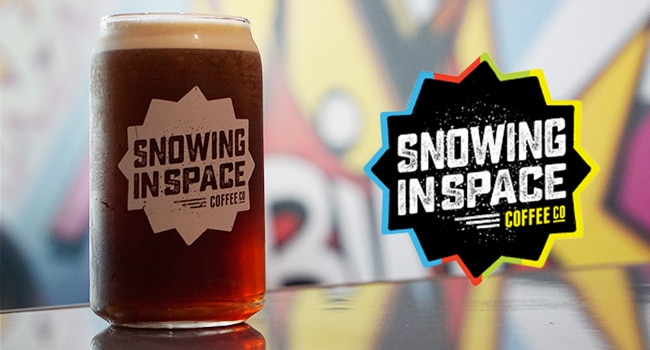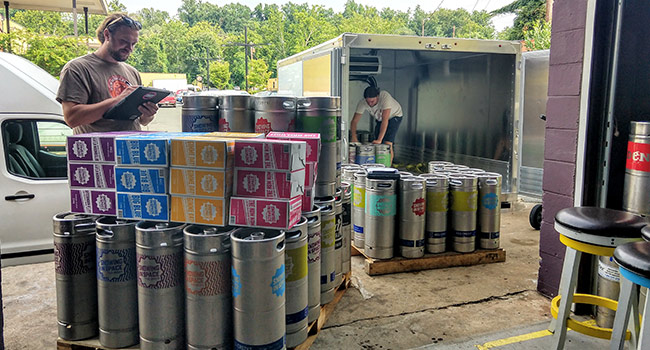This month, Charlottesville, Virginia-based cold brew maker Snowing In Space Coffee Co. will cross the 1,000 retailer threshold, landing placements for its four-SKU line of nitro-infused coffee in 300 locations across Giant’s Landover and Martins divisions, along with around 150 Fresh Market locations. With its playful naming conventions (“Gimme Dat!,” “Nom Nom”) and retro sci-fi aesthetic, the brand offers an injection of personality to an at-times staid cooler shelf.
“We want to be a fun, approachable brand,” co-founder Paul Dierkes told BevNET last week. “We want people to like the product and think it’s tasty, and to think we are unpretentious and engaging. But behind the scenes, we are working really hard and the operation itself is pretty serious.”
On the low, Dierkes and the Snowing in Space team — which includes co-founders Damian Warshall and Joel Artz — have been pushing a different kind of innovation. While it doesn’t offer brews infused with CBD or blended with plant milks, the company with the flashy branding has instead focused on more practical concerns: scaling production and distribution operations, including moving from its current 4,000 square foot home into a new 10,000 square foot facility this fall. The motivation is simple: Having taken a DIY approach in getting the brand off and running, the brand don’t see a reason to change.
“Our goal is to make the price point (for cold brew) more approachable and to make the product more widely adopted,” he said. “By doing it ourselves we have more control over the costs to the consumer. It just makes total sense for us.”
More explicitly, the goal is to maintain the price of the brand’s 12 oz. nitro-infused cans to between $2.99 and $3.29. For Snowing in Space, launched in 2016, that has meant investing in cold chain self-distribution with a fleet of three refrigerated trucks that service 600 accounts each month. Dierkes said Snowing in Space distributes to around half of its soon-to-be 1,200 stores, including the 10-20 Kroger locations it is set to enter in Virginia this fall as part of a pilot launch at the retail chain. Meanwhile, UNFI handles major chain accounts, including all 57 Mid Atlantic region Whole Foods locations and the forthcoming Giant and Fresh Market placements.
Taking charge of distribution, according to Dierkes, was initially a way to protect the brand’s integrity. Working with retailers directly helped build the brand’s CPG presence, while handling delivery and setup for office keg systems allowed the company to ensure product quality and customer experience. Since then, Snowing in Space has brought additional beverages on to its trucks, distributing products from fellow Mid Atlantic drink makers Wild Kombucha (Baltimore, Maryland) and Sunomi Switchel (Washington, D.C.).
Along with its own flagship offerings, Snowing in Space has also extended its business by leveraging its cold brewing expertise (and its customer base) to develop partnerships with independent coffee roasters in the region. Because it’s not a roaster itself, Snowing in Space is free to pursue partnerships with independent operators to produce cold brew and distribute cold brew as part of its product catalogue. Dierkes said the company currently produces over 20 different styles of cold brew, with typically around 10-15 of those at any given time being collaborations. These include varieties made with beans from Mudhouse Roasting (Charlottesville), Lost Sock Roasting (Washington, D.C.), Black Hand Coffee Co. (Richmond, Virginia) and Blanchard’s Coffee Roasting Co. (Richmond). Beyond coffee makers, Snowing in Space has also worked with Virginia Distillery Company on a whiskey-aged cold brew.
“Working with all these roasters allows us to go into an office in D.C. and offer three local roasters, or our flagships which are in chain grocery stores,” he said. “You have a wide variety of products and you know where they are all being made, you know they are being kept cold and that ideally everything will come out as you expect it.”
Even as he called self-distribution “core to what we are doing,” Dierkes acknowledged that the brand’s self-reliance will be tested as the business grows. Along with gradually expanding to stores outside of the Mid Atlantic, the company is also exploring adding a second brick-and-mortar cafe to complement its single existing Charlottesville location.
As it grows, Dierkes said the company will continue to invest in itself, noting the expected arrival of a fourth cold delivery truck by next year. By that time, the company hopes to be able to showcase its newest innovation: a 4-pack priced below $10.
“We’re going to be able to get the price point down over time,” he said. “We’re not a ‘premium coffee brand’ that’s built a business off of higher-cost coffee. We can come in at a more approachable price point and it fits within our brand a little bit better than it might for someone else.”

